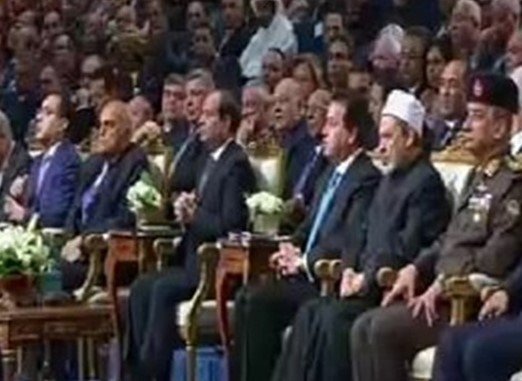As Egyptian CEOs tour Abuja, both nations vow to unlock investments in minerals, energy, and agriculture
In a move that could reshape economic relations across the Islamic world, Nigeria and Egypt have reaffirmed their commitment to boosting intra-D-8 trade—an ambitious plan by the Developing-8 group to hit $500 billion in collective trade volume by the end of the decade.
The renewed push came during the second edition of the Nigeria-Egypt Business Forum, held Monday in Abuja. With over 30 executives from Egypt’s largest companies on the ground seeking investment opportunities, and Nigerian officials signaling open arms, the momentum for collaboration is clearly accelerating.
At the center of the gathering were two seasoned diplomats: Nigeria’s Minister of Foreign Affairs, Yusuf Tuggar, and his Egyptian counterpart, Badr Abdel Aaty. Their message was clear—economic diplomacy is no longer optional; it’s an imperative.
Two Heavyweights, One Continent
As the only two African members of the D-8 Organisation for Economic Cooperation—a bloc that includes Turkey, Iran, Bangladesh, Pakistan, Malaysia, and Indonesia—Nigeria and Egypt see themselves not just as national players, but as continental anchors for South–South trade.

Tuggar emphasized that both nations must play a “leadership role” in helping the group achieve its $500 billion intra-trade target by 2030. “It is no longer enough to trade with the West or China alone,” he said. “The Global South must trade with itself.”
The sectors on the table are wide-ranging and critical to both economies:
-
Solid minerals
-
Renewable energy
-
Agriculture and water management
-
ICT and telecoms
-
Pharmaceuticals and healthcare manufacturing
-
Aviation and logistics
-
Leather and textiles
-
Tourism and hospitality
Each of these industries has been marked out for bilateral cooperation—many of them already flagged in Nigeria’s industrial policy plan and Egypt’s Vision 2030.
Egyptian Private Sector Eyes Nigeria
The visiting Egyptian business delegation, which includes top-tier players from Cairo’s pharma, agriculture, and infrastructure sectors, is exploring everything from joint ventures to logistics hubs. According to Egyptian Foreign Minister Abdel Aaty, the goal is “not just trade, but long-term, inclusive investment.”
“This isn’t just symbolic,” Abdel Aaty told journalists after his meeting with Tuggar. “We’ve come here with our best companies to find areas where we can partner, build factories, and train workers—not just import and export.”
One executive from an Egyptian agribusiness firm, speaking on condition of anonymity, said they were considering setting up a food-processing facility in northern Nigeria, with plans to distribute across West Africa.
A Nigerian official in the Ministry of Industry said that four investment memorandums had already been signed on the sidelines of the forum.
Short sentence here.
“We are not just hosting a talk-shop,” he said. “This is real money, real jobs, and real factories in the making.”
Shared Challenges, Shared Potential
Both Nigeria and Egypt face similar challenges: youth unemployment, rising import bills, and foreign exchange volatility. But that also means there’s room to learn from each other—and to build joint solutions.
For example, Egypt’s textile sector has managed to weather currency fluctuations better than most emerging markets. Nigeria, meanwhile, holds a deep bench of raw materials—from lithium to cashew—that Egyptian manufacturers crave.
“Why should Egypt import Brazilian leather when Kano is four hours away by air?” asked a Nigerian trade consultant. “Likewise, why should Nigeria buy European pharmaceuticals when Cairo’s generics are WHO-certified and affordable?”
That kind of logic is starting to gain traction—especially as both nations rethink over-reliance on traditional partners in Europe and Asia.
Africa’s D-8 Influence Is Growing
The D-8, established in 1997, has often operated in the shadow of larger blocs like BRICS and the African Continental Free Trade Area (AfCFTA). But with renewed urgency around South–South cooperation, and a clear economic need for diversification, it’s suddenly finding its feet again.
With Egypt and Nigeria as continental lynchpins, there’s potential for a D-8 revival with real teeth.
Here’s a breakdown of the D-8 trade vision:
| D-8 Goals by 2030 | Status |
|---|---|
| $500 billion intra-bloc trade | $181 billion as of 2024 |
| Lower non-tariff barriers | Ongoing discussions |
| Trade digitalization | Pilot projects in Egypt, Indonesia |
| Youth entrepreneurship exchange | To be scaled up in 2026 |
For Nigeria and Egypt, achieving these goals means reimagining trade beyond oil and gas—and doubling down on processing, innovation, and infrastructure.
A Step Toward South–South Solidarity
Beyond trade figures and investment deals, the Nigeria–Egypt forum carried a symbolic weight.
For years, Africa’s two largest economies outside of South Africa have interacted more at multilateral events than on a bilateral stage. Now, with business delegations meeting face-to-face and ministers pledging reforms, that gap is starting to close.
One-liner.
“We see Nigeria as our strategic gateway to West Africa,” said one Egyptian textile executive. “And I believe Egypt can be Nigeria’s bridge to the Arab world.”
Next: Implementation
While announcements are encouraging, the real test lies in follow-through.
Will Egypt’s CEOs return to Cairo with contracts—or just brochures? Will Nigerian regulators cut red tape for new investors? Will visa and travel restrictions be eased to enable smoother business?
Those are the questions officials on both sides must now answer.
Still, Monday’s forum has raised hopes that Africa’s powerhouses are finally walking the talk.
